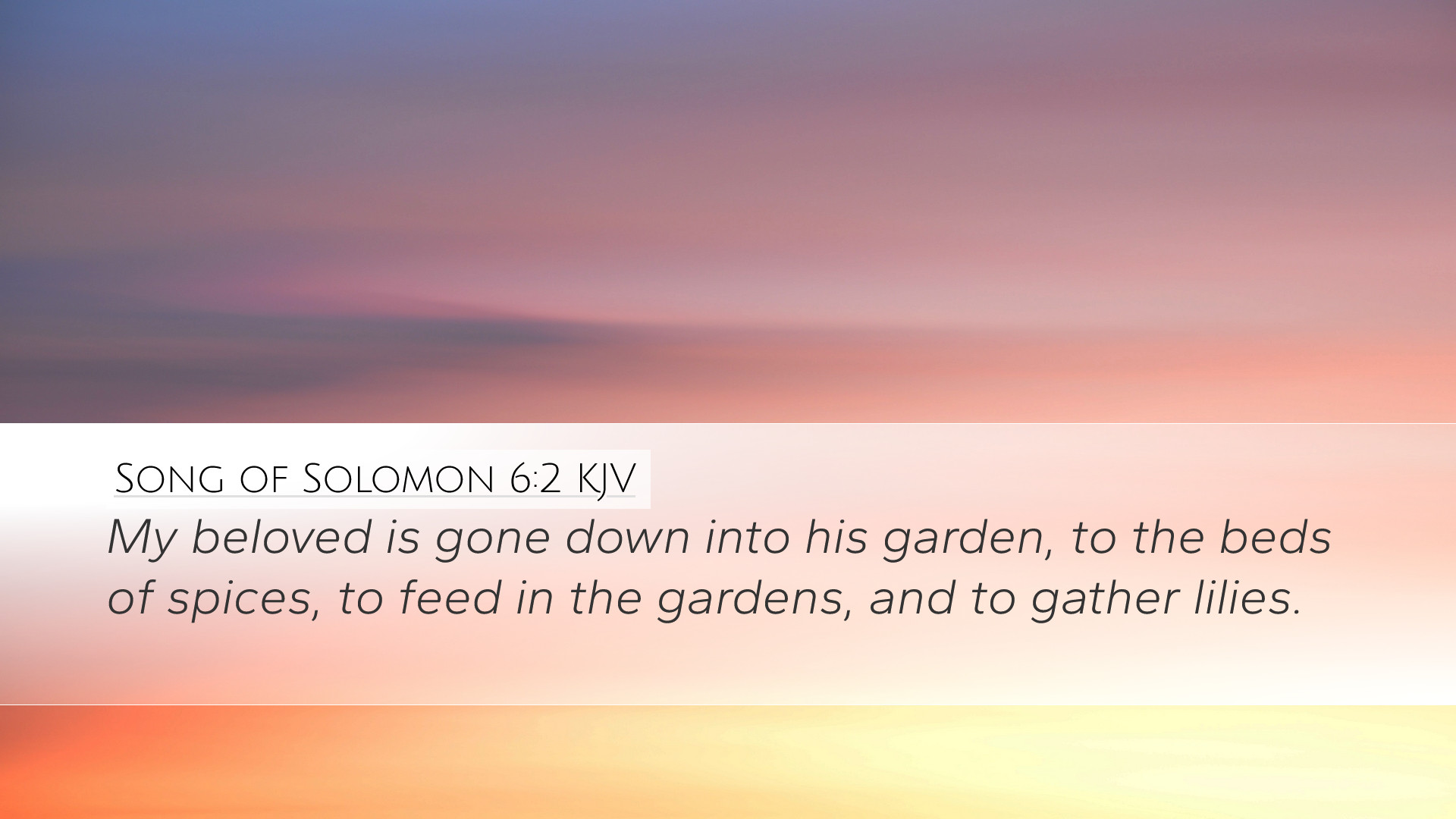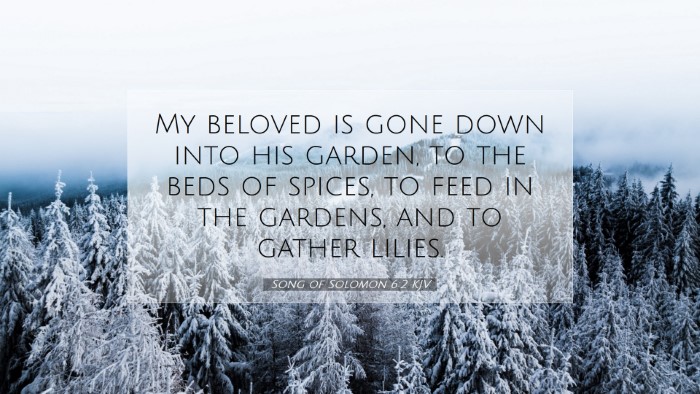Old Testament
Genesis Exodus Leviticus Numbers Deuteronomy Joshua Judges Ruth 1 Samuel 2 Samuel 1 Kings 2 Kings 1 Chronicles 2 Chronicles Ezra Nehemiah Esther Job Psalms Proverbs Ecclesiastes Song of Solomon Isaiah Jeremiah Lamentations Ezekiel Daniel Hosea Joel Amos Obadiah Jonah Micah Nahum Habakkuk Zephaniah Haggai Zechariah MalachiSong of Solomon 6:2
Song of Solomon 6:2 KJV
My beloved is gone down into his garden, to the beds of spices, to feed in the gardens, and to gather lilies.
Song of Solomon 6:2 Bible Commentary
Commentary on Song of Solomon 6:2
The verse Song of Solomon 6:2 states: "My beloved is gone down into his garden, to the beds of spices, to feed in the gardens, and to gather lilies."
This poetic verse opens pathways to deep exploration and ample reflection, as it encapsulates themes of intimacy, longing, and the beauty of divine relationship. In understanding this verse, we’ll draw from interpretations of Matthew Henry, Albert Barnes, and Adam Clarke.
Context and Themes
The Song of Solomon is a unique biblical book, often considered a celebration of love and desire, where marital relationships are an analogy for the relationship between God and His people. In this particular verse, we observe a profound and poignant moment in the dialogue.
Intimate Imagery
The reference to the “garden” is rich with symbolism, suggesting not only a place of beauty but also a space of mutual delight and exploration.
- Matthew Henry notes that the garden is a metaphor for a thriving relationship, emphasizing the need for cultivation and mutual care.
- Albert Barnes reflects that the garden represents the church and believers, where Christ, the beloved, engages with His people, nurturing them and gathering spiritual fruits.
- Adam Clarke highlights that "gathering lilies" signifies an appreciation for purity and beauty, illustrating how the beloved collects the treasures of love within the sacred garden of intimacy.
The Beloved's Activity
The phrase “gone down into his garden” indicates an intentional, active pursuit by the beloved. It suggests that there is deliberate engagement required in a loving relationship. This pursuit mirrors the way God seeks out His creation.
- Matthew Henry emphasizes that the relationship between the lovers, reflective of divine love, requires effort and attention, underscoring the importance of seeking one another regularly.
- Albert Barnes asserts the importance of Christ's active role in the life of the church, stressing that He is continually present and at work among His people.
- Adam Clarke mentions the significance of setting aside time to explore relationships, advocating for the notion that a healthy spiritual life necessitates going into the “garden” of connection and experience.
Symbolism of the Garden
The garden serves as a multi-faceted symbol within biblical literature, representing:
- Creation and Divine Intent: The garden echoes the Garden of Eden, where the intimate relationship between God and humanity was first established.
- A Space of Growth: It signals a nurturing environment for cultivating virtues and qualities essential to a flourishing relationship.
- Beauty and Abundance: The “beds of spices” imply variety and richness within relationships, signifying that love is adorned with diverse elements, each enhancing the whole.
The Gathering of Lilies
The act of gathering lilies is illustrative of recognition and cherishing what is valuable in a relationship.
- Matthew Henry states that these lilies symbolize both purity and beauty, underscoring the ideal of a relationship rooted in holiness.
- Albert Barnes observes that the gathering suggests an appreciation for the virtues that one finds in the beloved, which are to be nurtured and celebrated.
- Adam Clarke expresses that the act of gathering conveys thoughtful participation in the cultivation of beauty within relationships.
Spiritual Reflections
This verse also carries profound spiritual implications for believers. The garden can be seen as a metaphor for the church, where Christ ministers to His people.
- Fellowship with God: Emphasizing the necessity of closeness and active participation in one’s faith.
- Spiritual Nourishment: A reminder that believers must allow God to nurture their hearts and spirits as they engage with Him.
- Collective Purpose: As lilies are gathered, Christians are called to work together in pursuit of divine love and virtues, collectively fostering an environment of God’s glory.
Conclusion
In the exploration of Song of Solomon 6:2, we unveil a rich tapestry woven with themes of intimacy, love, nurturing, and beauty. The insights from Matthew Henry, Albert Barnes, and Adam Clarke provide a multifaceted understanding that is both applicable and transformative for pastors, students, theologians, and scholars.
As the Church reflects on this verse, may they emulate the relationship depicted—an active, engaged, and lovingly cultivated connection with God, celebrating the “garden” of faith, replete with the "lilies" of virtue and grace.


